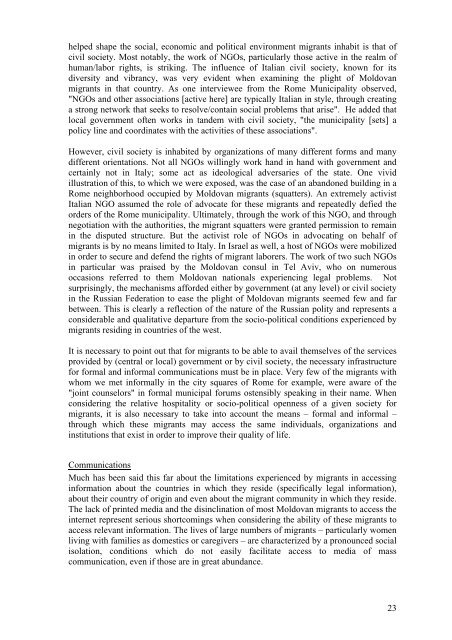Exploring the Link between Moldovan Communities Abroad ... - Iom
Exploring the Link between Moldovan Communities Abroad ... - Iom
Exploring the Link between Moldovan Communities Abroad ... - Iom
You also want an ePaper? Increase the reach of your titles
YUMPU automatically turns print PDFs into web optimized ePapers that Google loves.
helped shape <strong>the</strong> social, economic and political environment migrants inhabit is that ofcivil society. Most notably, <strong>the</strong> work of NGOs, particularly those active in <strong>the</strong> realm ofhuman/labor rights, is striking. The influence of Italian civil society, known for itsdiversity and vibrancy, was very evident when examining <strong>the</strong> plight of <strong>Moldovan</strong>migrants in that country. As one interviewee from <strong>the</strong> Rome Municipality observed,"NGOs and o<strong>the</strong>r associations [active here] are typically Italian in style, through creatinga strong network that seeks to resolve/contain social problems that arise". He added thatlocal government often works in tandem with civil society, "<strong>the</strong> municipality [sets] apolicy line and coordinates with <strong>the</strong> activities of <strong>the</strong>se associations".However, civil society is inhabited by organizations of many different forms and manydifferent orientations. Not all NGOs willingly work hand in hand with government andcertainly not in Italy; some act as ideological adversaries of <strong>the</strong> state. One vividillustration of this, to which we were exposed, was <strong>the</strong> case of an abandoned building in aRome neighborhood occupied by <strong>Moldovan</strong> migrants (squatters). An extremely activistItalian NGO assumed <strong>the</strong> role of advocate for <strong>the</strong>se migrants and repeatedly defied <strong>the</strong>orders of <strong>the</strong> Rome municipality. Ultimately, through <strong>the</strong> work of this NGO, and throughnegotiation with <strong>the</strong> authorities, <strong>the</strong> migrant squatters were granted permission to remainin <strong>the</strong> disputed structure. But <strong>the</strong> activist role of NGOs in advocating on behalf ofmigrants is by no means limited to Italy. In Israel as well, a host of NGOs were mobilizedin order to secure and defend <strong>the</strong> rights of migrant laborers. The work of two such NGOsin particular was praised by <strong>the</strong> <strong>Moldovan</strong> consul in Tel Aviv, who on numerousoccasions referred to <strong>the</strong>m <strong>Moldovan</strong> nationals experiencing legal problems. Notsurprisingly, <strong>the</strong> mechanisms afforded ei<strong>the</strong>r by government (at any level) or civil societyin <strong>the</strong> Russian Federation to ease <strong>the</strong> plight of <strong>Moldovan</strong> migrants seemed few and far<strong>between</strong>. This is clearly a reflection of <strong>the</strong> nature of <strong>the</strong> Russian polity and represents aconsiderable and qualitative departure from <strong>the</strong> socio-political conditions experienced bymigrants residing in countries of <strong>the</strong> west.It is necessary to point out that for migrants to be able to avail <strong>the</strong>mselves of <strong>the</strong> servicesprovided by (central or local) government or by civil society, <strong>the</strong> necessary infrastructurefor formal and informal communications must be in place. Very few of <strong>the</strong> migrants withwhom we met informally in <strong>the</strong> city squares of Rome for example, were aware of <strong>the</strong>"joint counselors" in formal municipal forums ostensibly speaking in <strong>the</strong>ir name. Whenconsidering <strong>the</strong> relative hospitality or socio-political openness of a given society formigrants, it is also necessary to take into account <strong>the</strong> means – formal and informal –through which <strong>the</strong>se migrants may access <strong>the</strong> same individuals, organizations andinstitutions that exist in order to improve <strong>the</strong>ir quality of life.CommunicationsMuch has been said this far about <strong>the</strong> limitations experienced by migrants in accessinginformation about <strong>the</strong> countries in which <strong>the</strong>y reside (specifically legal information),about <strong>the</strong>ir country of origin and even about <strong>the</strong> migrant community in which <strong>the</strong>y reside.The lack of printed media and <strong>the</strong> disinclination of most <strong>Moldovan</strong> migrants to access <strong>the</strong>internet represent serious shortcomings when considering <strong>the</strong> ability of <strong>the</strong>se migrants toaccess relevant information. The lives of large numbers of migrants – particularly womenliving with families as domestics or caregivers – are characterized by a pronounced socialisolation, conditions which do not easily facilitate access to media of masscommunication, even if those are in great abundance.23
















